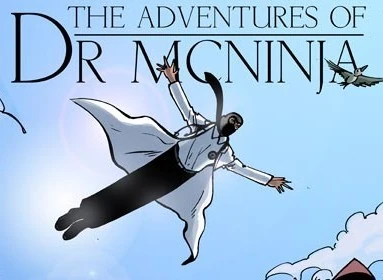I am basing the content of this post on the thought-provoking prompts of Ms. Eineichner, who wrote:
“Do you think autism spectrum disorder has been "around" since the beginning of when God made Adam and Eve, not that Adam and Eve would have been diagnosed with it, but that the potential was there for people to have the characteristics? Do you think that society now tries to make people conform to idealized human expectations, instead of just being more accepting of people? How do Amish societies compare with children being diagnosed?”
I want to first give two disclaimers.
- I am far from an expert on the matters of autism; all of these are my own thoughts and suppositions based on the history of autism and mental health in the bible.
- My views do not necessarily reflect that of REACH for a Difference.
These clarifications are simply so that if you disagree, please let me know. Argue with me. The healthiest, deepest thoughts and opinions are those that are challenged through well-reasoned discourse. I will never be offended by contradiction of my ideas because at the end of the day, I am only a moderately educated 29 year old and can only really think as such.
The second disclaimer is that if you read this, knowing that I work for REACH (an organization that provides resources and services to families affected by autism), it does not mean that REACH as an entity or the other members of the organization share the same beliefs as I do. Honestly, I hope that I do not write anything that would be construed as offensive, but as my primary form of writing is a stream-of-consciousness/thinking-out-loud sort of system, I am not really certain where this is going to end up. I am usually fairly careful to keep my opinions neutral in an Aaron Burr-esque manner, but we’ll see on this particular topic.
Without further pomp and circumstance, on to the questions!
First: Do you think autism spectrum disorder has been “around” since the beginning of when God made Adam and Eve?
For those of you that follow this blog, you are probably aware, but I will go ahead and get it out there for clarity’s sake--
I am a Christian. I do believe in God and the Bible and all the nummy little tidbits that lie therein.
So, back to the question. I actually do not believe that ASD has been around since the dawn of humanity.
“There are studies that suggest” is one of the most misleading, misused arguments (in my opinion). Regardless of your stance, there will be ample studies available from friendly, helpful Google to defend your point of view. I could tell you that some scientists believe that autism has been around, at the same prevalence as we see today, for over 1000 years. Honestly, it is very hard to pinpoint when the disorder actually came into being because no one was tracking it historically, and we don’t know quite enough about the genetic indicators to be able to test residual DNA in centuries-old skeletons.
There are of course the historical figures that, through a lens of modern diagnostics, have been posthumously labeled as potentially on the spectrum--the earliest I have seen being Michelangelo (1475-1564) and Sir Isaac Newton (1643-1727).
Interesting, though specious at best, during my research for this post I stumbled upon an article that visits neurological diseases among biblical characters of the old testament. In it, the authors argue that Samson in Judges may perhaps have been on the spectrum. The stories they use to bolster their arguments point to a possible seizure (Judges 13: 25), abnormal eating in the case of honey in the lion carcass (14:8-9), failure to comprehend Delilah’s deception (chapter 16), and extraordinary human strength (14:6, and chapters 15, and his death in chapter 16) which may have been a result of an insensitivity to pain.
The most concerning and deceptive argument is that Samson’s aggression and violence is a damning trait, citing a Swedish article linking autism to violent tendencies.
You can interpret this information any way you choose; frankly, I read it as seeing what you want to see. They went into the bible looking for neurological disorders, stuck in their thumb and pulled out Samson and autism. It doesn’t really fit, and we have inadequate information to be making such a claim. The references they were able to pull come off as more eccentric, and weird is weird but not necessarily noteworthy.
The earliest probable description of an autistic child was made in 1800 by a French physician named Jean Marc Gaspard Itard. The child, Victor of Averyon, was a “feral child” who was found when he was about 12. He attempted to run away from civilization approximately 8 times before Itard took an interest in him, working with him for five years and recording the boy’s progress as he devised new ways of teaching. This was the sort of birth place of adaptive or special education for children that are developmentally delayed.
Once again, we cannot definitively say that Victor had autism, though this is more of a compelling story than the one of Samson. He was a 12 year old non-verbal absconder that was developmentally underdeveloped, but showed progress under directed and intentional adaptive tutorage. That could be any number of disorders.
All of that is speculation--we don’t know for sure on any of it. What we can be sure of is the psychiatric timeline of autism, starting with Eugen Bleuler in 1908 who coined the term “autism” to describe schizophrenic patients that had retreated into their own world. The word he used, “autism”, was from the Greek autos, meaning “self” to express how the individual seemed to be lost in a world within themselves, an “isolated self”.
For a long time, autism and schizophrenia were nearly synonymous, autism believed to be a form of schizophrenia. From a diagnostic standpoint, I can see where that would make sense. The symptoms of schizophrenia were listed as delusions, trouble concentrating, confused thought or speech, being zoned or distracted, unusual movement patterns, emotionless or flat voice, withdrawal, struggling with the basics of life, lack of self-care, difficulty organizing thoughts or making decisions. A lot of those would be indistinguishable from autism. Bleuler used “autism” to describe a morbid self-admiration.
In the 1940’s, Leo Kanner studied 11 children that presented with difficulties in social situations, difficulty adapting to changes in routine, good memory, sensitivity to stimuli particularly sound, resistance and allergies to food, good intellectual potential, echolalia or propensity to repeat, and difficulty with spontaneous activity. At the same time but separate from Kanner, Hans Asperger studied children with similar traits with the exception of echolalia (echolalia being a “meaningless repetition of another person’s spoken words as a symptom of a psychiatric disorder”).
Kanner and another child psychiatrist Bruno Bettelheim believed autism stemmed from emotional coldness from the mother.
Up until the 1960’s, schizophrenia and autism were linked in many physicians’ minds. The 1960’s and 70’s showed research into treatments for autism such as LSD, electric shock, and behavioral change techniques reliant on pain and punishment.
Autism has likely existed for several hundreds of years, if not more. I believe the pervasiveness has stayed pretty static as well. From a medical standpoint, we haven’t been all that aware of this condition until very recently, and our ability to identify it is only in the last few decades becoming refined.
Part of the rise in diagnosis is linked to our better diagnostic abilities and the implementation of routine pediatric screenings. Another ties into the last point (I will get to the middle question last; what can I say--I’m a rebel).
Question numero 2: How do Amish societies compare with children being diagnosed?
Through limited studies, it has been suggested that Amish societies have a much lower rate of ASD or learning disabilities than the general population.
Most will suggest this is because they do not vaccinate their children.
I will not personally engage in the vaccination debate. What I believe doesn’t matter; what I know is that parents that are confronting a child diagnosed with autism is short on hope. How they need to cope with this (honestly) traumatic life event, I refuse to judge.
Back to the Amish at hand: they are removed from the wonders of modern society, and (I believe) that this explains their smaller spectrum numbers.
Sit down and really focus on the sensory input that is going on around you. Think about all the things you can see, smell, taste, hear, feel. Think about your position on the earth, the movements of your body, the force you have to exert to stay in the position you are currently in. Does anything hurt? Itch? Are you hungry or thirsty? How is the temperature of the room? Which direction are you facing? Do you need to go to the restroom?
Your mind will tell you again and again how very clever and amazing it is. It really is. One of the things it does best is compartmentalizing: what is important, what is not important. Which is why after a while of being in a room you will stop noticing the smell, and why you can only actually see your nose when you consciously think about it even though it is always in your view. (You just looked at your nose, didn’t you?)
When you have autism, your mind isn’t able to determine what is important (and therefore worthy of your attention) and what is not. It isn’t necessarily this way with all the senses. Some will function more or less the same way yours does. Others will get turned up or turned down.
A bit confusing, no?
Electricity is not one steady stream as we perceive it. A fluorescent light bulb, for example, will flash on and off 120 times a second. You look at the light and see just that--light. A brain that is hypersensitive to visual input though will go “Light! Light! Light! Light! Light! Did you see the light! Light! Light!” for every one of those little pulses your mind found uninteresting. How very distracting that could be!
The fluorescent light also makes a buzzing noise caused by the transformer or the ballast, which causes the audible buzzing and flickering. Many autistics present with auditory hypersensitivity, and will hear that ambient buzzing as a though it were a fly directly sitting on their eardrum. Their mind doesn’t close the gate on background noise like a neurotypical brain might.
To accommodate for those extra-loud senses, sometimes others will be turned down--the ability to feel pain for example, which sounds fun until you remember leprosy or CIPA. God made us to feel and experience pain so that we can move away from things that are damaging our earthly bodies.
You probably already knew all of this; I offer it as a reminder because with the great convenience of modern advancements comes a veritable hurricane of offensive sensory input. In all our houses and on all our persons, in every grocery store and movie theatre and business we might frequent, there are legions of droning, warbling, beeping, blinking, incessant outputers--iPhones, televisions, radios, air conditioners computers. All of these things that our brain has eventually learned to tune out as unimportant ambience is still very much registered on a sensory level for individuals with autism.
This assaulting barrage of input is what we have to breach to be heard and really fully understood by an individual with autism. It is this impenetrable wall; once we get over it, there are still many obstacles to face instructing an autistic individual in the manner in which they can learn, but that first one is the hardest. One that many get stuck on.
Amish societies that eschew the “convenience” of modern technologies have effectively (though unintentionally) eliminated the first hurdle.
Which brings us to the final question: Do you think that society now tries to make people conform to idealized human expectations, instead of being more accepting of people?
Yes. I do.
It is really hard concept to confront: Autistics may do some things better than we do.
The easiest comparison I can make is left-handedness. The dominantly left-handed makes up about 10% of the population, but even late into the 20th century, schools would require students to write “correctly” with their right hand.
Of course, we know now that there is nothing wrong with being left-hand dominant. It does not mean you are in cohorts with the devil or destined to be a criminal. It just means you were hardwired differently.
That is much how I see autism. It is not a disease, it does not need to be cured. There is nothing wrong with the way an autistic brain functions. The failing comes not in the individual, but in our manner of teaching them.
Don’t get me wrong: it is hard. It is like trying to imagine a color that doesn’t exist. It is this huge, abstract ideal that we are only able to tackle using the information that we have available, and we keep trying to rework it into an accessible formula. The more that we are able to communicate with individuals with autism--not the parents or the ones that study them, not the professionals or teachers, but those that actually have autism--the more we are going to be able to learn, to adapt and meet them in a common place.
There are some things that would make life easier, more pleasant, if we could teach it. Specifically, a manner of communication both parties can understand, redirection from harmful or dangerous behavior, how to self-regulate with regards to sensory input.
Others just make us more comfortable. It really doesn’t hurt anything if someone isn’t making eye contact, if they are rocking or flapping because it helps them. Touching should be at the comfort level of the individual, not forcing physical contact or affection because it is expected. A person talking at length about one particular subject can get boring, but hey--who can claim to be the most interesting person every time they talk?
The common practice is to shape individual into what society demands them to be. We say it is because it will make life easier on them, they won’t stand out as much, draw attention to themselves. But that really isn’t the case. People that are different worry us. They’re unpredictable because we don’t know what to expect.
An adjustment of our expectations, a tolerance for behavior that hurts nobody but that just differs from our own, would go a long way toward making the world a more autism-friendly place.
Thank you, Ms Eineichner for the very interesting questions! I hope you found my answer satisfactory; I really enjoyed researching and writing it :)
For those of you that would like to visit my sources:
--Andie


















